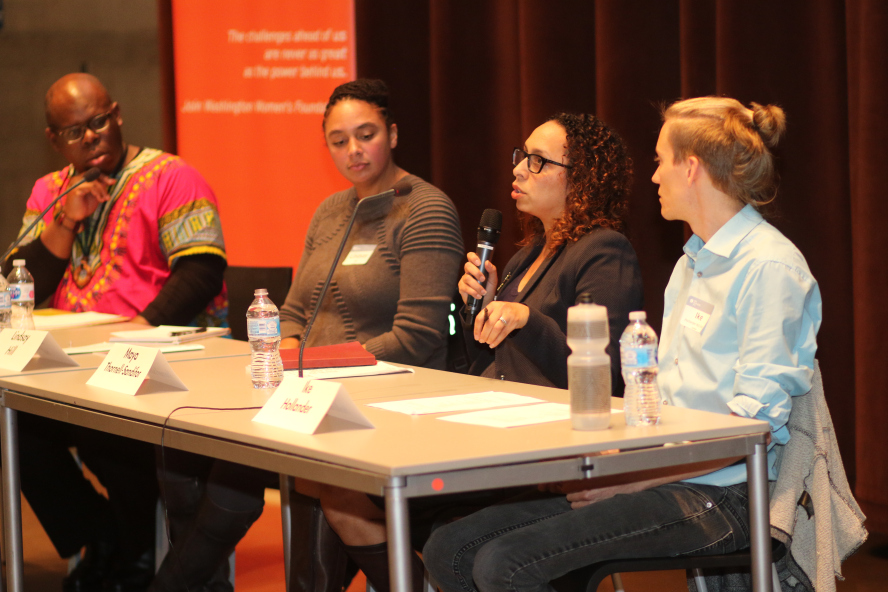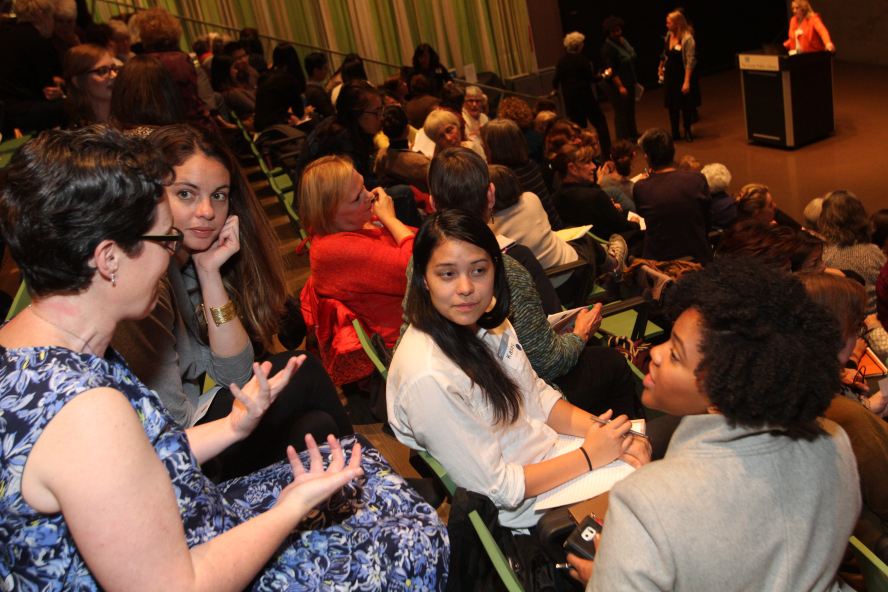In 2017, Washington Women’s Foundation rebranded our annual educational event formerly known as “Discovery Days.” We wanted to invite you to go deeper than “discovery,” which is simply becoming aware of something that you did not already know. We also wanted to disrupt the balance of power between those “who know” and those “who don’t know,” to build a greater sense of shared community between the presenters, members of WA Women’s Foundation and our guests, including grantees and other community partners.
One meaning of the event’s new name – Intersect – is “to share a common area.” If you joined us at Intersect this past November, I hope you felt a greater sense of inclusion and connectedness to our speakers and to each other as we engaged in more conversation throughout the day.
Some of what we heard at Intersect this year challenged our thinking about the way we practice philanthropy at Washington Women’s Foundation. One of panelists noted, “Philanthropy was not created to be about the redistribution of wealth or access to power or privilege. It was created to put Band-aids on outcomes downstream and get tax deductions.”

Equitable Grantmaking panel featuring (from left) Dr. Gary Kinte Perry, Lindsay Hill (Raikes Foundation), Maya Thornell-Sandifor (Philanthropy Northwest), and Ike McCreery (Resource Generation)
When Washington Women’s Foundation was formed 20+ years ago, our founders were challenging the conventions of “traditional philanthropy” at that time dominated by white men of wealth. They instead created a collective, women-powered model of philanthropy rooted in equality and community. This willingness to imagine philanthropy as something different than the traditional norms has placed us on the cutting edge for many years – we have been leaders in awarding multi-year grants, providing general operating support and investing in capacity-building. However, at Intersect, we heard that we clearly can do more.
Shortly after attending Intersect I read an online article by Vanessa Daniel, Executive Director of the Groundswell Fund. Entitled “America is Burning” the article referenced many of the themes we heard from speakers at Intersect. Of philanthropy, Ms. Daniel notes:
Large scale social change is not created by philanthropy, but philanthropy does have an impact on who has the resources to engage and at what scale. It has an impact on the pace at which people can be organized. It influences which strategies and leaders are legitimized in the eyes of those who have money and can thus affect who has the resources to shape narratives and drive approaches to social change.
This struck a particular chord with me as we know that our grant making influences the grant making decisions of other funders in town. Whether it is our intent or not, we are having an impact on how resources, even beyond our own, are being allocated in communities throughout the state. With this power, comes a duty and an obligation to listen to our community and make our decisions carefully and strategically.
So what did our community of speakers ask of us at Intersect?
- Listen to learn. Sarah Tran charged us to “listen relentlessly.” Another speaker noted, “Communities have their own answers; get to know the community.”
- Continue to provide general operating and capacity-building support.
- Also invest in advocacy, public policy work, coalition- and power-building among organizations led by people of color.
- Fund organizations that are focused on systems change. Move funding “upstream” to work on root causes, which mainly arise from a lack of access to resources and a lack of access to power.
- Think about the balance of power in every step of our grant making process.
They also encouraged us to share the power that we have as a collective. WA Women’s Foundation member Jodi Green took note of a definition of “power” shared at Intersect that really resonated with her – “Power is the ability to get things done, the ability to change the rules of the game, and the ability to shape what people think is possible.” How can we allocate our grant making dollars to allow community based organization to get things done, to change the rules of the game, and/or shape what people think is possible?

Our speakers also encouraged us to think about our collective power beyond grant making.
- Provide access; bring communities of color to the table with capacity to participate.
- Create community convenings, and elevate the voices of others.
- Build authentic relationships. Get out into the community and take the time to hear individuals’ lived experiences.
- Use our own voices to elevate issues and advocate for change.
These are bold statements and big challenges, not all of which we can achieve through our Pooled Fund grant making process as it is currently structured. However, Pooled Fund Grant Committee Chair Susan Heikkala and I suggest that if you are serving on the 2018 Pooled Fund Grant Committee, you use that opportunity to model and practice behavior that is consistent with the advice we received at Intersect.
In your work group meetings, try to do the following:
- Share power. Encourage more voices to come into the conversation. If everyone in your work group participates equally and fully, you will benefit from the collective wisdom of the group. Also, consider whether the organizations that are moving forward in your group are ones that have traditionally had more resources/power than others. Is it possible that other organizations, if given resources, would actually have a greater impact on the issue because they are closer to the communities most effected?
- Listen relentlessly. Listen not only to your fellow members but also reflect on the voices not represented at the table. The voices of the community can be found in an organization’s LOI. What is the community telling us about their needs through the organization and its LOI? More importantly, what solution is community proposing?
- Commit to having a learning mindset. Notice and be curious about your reactions to the LOIs and proposals. How are your lived experiences and biases influencing your opinions and feelings? How would different experiences influence your perspective?
- Practice inclusive philanthropy. Think about where inequity exists and consider elevating the LOIs that “work upstream” on root causes, offer the most promising solutions, the greatest opportunities for reducing disparities and/or reflect the voices of communities not typically heard. If only LOIs from white-led organizations working with people of color seem to be moving forward in your work group, then your work group may want to pause and discuss this fact.
- Embrace Your Discomfort. Making decisions about which organizations to fund has never been easy. This year will be no different. But we have never shied away from the challenge. These challenges are why we come together to do this work. Just remember that this process is not about finding perfect solutions. It’s about being committed to change and building a more equitable society where disparities caused by systems and institutions that do not treat all women, men and children equally do not dictate individual outcomes.
Even if you are not serving on this year’s Pooled Fund Grant Committee, we encourage you to continue this work. What can you do? At Discovery Days 2016, C. Davida Ingram, who also gave the opening remarks at Intersect, asked us to continue thinking and reflecting deeply about our privilege. Davida also urged us to participate in ongoing trainings about implicit bias. WA Women’s Foundation is offering a three-hour workshop on implicit bias on January 12, 2018, and all members are invited to attend. Also, when you receive your ballot and voter’s guide later this year, re-read this blog and think about how your vote will reflect the advice given to us by our community.
A woman who was bold enough to run for the highest office in our land once said, “I have always believed that women are agents of change, we are drivers of progress, we are makers of peace.” At WA Women’s Fdn, we have been investing in change, progress and peace for more than 20 years. The cause is even more urgent today, and there is more that we must do as a learning community of grant makers. Help us continue this conversation.